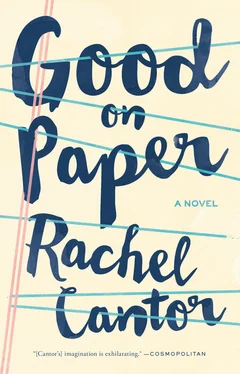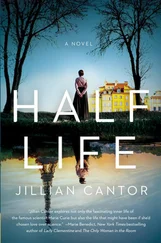After this, he has one final vision, which he declines to describe, saying only that he resolves at that moment to write no more of Beatrice till he can do so more worthily. Arguably, with Vita Nuova he does just that. He ends his journey with exactly what he needed: a pilgrim’s sense of purpose and the promise of a new poetic — the one he will use here, a poetic based on narrative, emphasizing the redemptive power of change.
So what redemptive journey did Romei hope to make? What elixir would he bring his ailing wife, if he couldn’t bring me? A new poetic? She’d be thrilled with that, I was sure.
I couldn’t see myself in the story anywhere, unless it was as an absence: the daughter who was not there, who refused to be there.
When Benny arrived, I was holding Romei’s pages tightly to my chest.
He pecked my cheek.
I can fax it here, right? he said of the translation. Do you mind?
His mind was on Gilgul , of course, the translation, finishing the issue before he left for Rome. He wanted to get the pages to Romei quickly, so he could include the translation, if Romei agreed, in the next issue, maybe scare up funding to expand the print run.
Of course, I said, clutching my folder. Can you sit for a while?
I’m so beat, you have no idea.
I’m tired too, I thought, but I need you.
And why are you tired? I asked.
Two weddings, he said, shaking his head, and I noticed he was dressed more formally than usual: black jacket, black tie, tzitzit swinging under a shiny black vest. Interfaith, he said. A beautiful thing, but the prep! First the Sufi girl and Reconstructionist boy in Central Park, then the Humanistic Jew, whatever that means, and the Christian Scientist …
In the library with Colonel Mustard?
The Masonic Temple on Amsterdam.
Poor sweetie! Have you eaten?
He looked at me as if I were crazy.
These were Jewish weddings! Look, he said, I brought you a vegan knish! Because I never stop thinking of you.
He produced a knish from his pocket, put it on the table. It was wrapped in a paper napkin decorated with a rainbow, two chirping birds, the names of the Sufi girl, the Reconstructionist boy. He stifled a yawn.
Did you ask if I wanted to do something? he asked.
He’s done it to me too! I said, my voice shaking. I spread the pages fanlike on the table.
No shit, Benny said, tugging his beard.
He handed me his hanky, inspecting it first for cleanliness, then held me as I whispered a broken tale of Andi and the fire of love, how it made me think of Romei and had I done the right thing, did he think I’d done the right thing?
Of course you did, my love. Of course you did.
I calmed and he faxed the translated scene to Romei, appending a brief herewith , then I fixed us some tea and settled onto the couch to read the next installment of Romei’s tale.
•
We don’t know how much time has elapsed. Esther, back in Rome, is no longer in physical crisis, or so we assume. In fact, we don’t know much about her. All we know is that she won’t read the pages Romei wrote for her, the pages imagining her life. Why? We don’t know. Romei doesn’t explain; perhaps he doesn’t know. Her ears are closed.
Romei becomes a crazed writer-animal, desperate for his wife’s attention: he leaves pages on her desk, under her dinner plate, amid her socks, inside the books she reads. He sends them special delivery, in burlap-wrapped packages sealed with wax, covered with the stamps and certifications, the bolli so loved by Italian officialdom. Fellini extras declaim scenes while Esther, indifferent, waits for her tram, waiters offer her menus with Romei’s pages attached. He returns to her desk, her books, finds his pages used for shopping lists, for doodles, the contours of which he searches for clues.
Esther is opaque, a thing-in-herself. We don’t know what she says, what she looks like, what she does. She is nistar , Romei writes, reduced to her Esther essence.
Nistar ?
Hebrew, Benny said, noshing absently on his knish. Esther , the word, is related to nistar . It means hidden or concealed .
Like celan in Dante’s Italian, I said, scooching closer.
No kidding!
Yeah. Does she really call herself Esther, or is that fiction as well?
She really is Esther, Benny said, laughing.
Esther becomes invisible; we infer her existence from Romei’s actions. Again, the story is all about Romei, crazed, lonely Romei, maybe it always had been.
Strange device, I thought. In that last section Romei “imagined” Esther, and now he’s returned to the “real” Esther. As if there were such a thing. Through all of Romei’s mirror tricks, all his inversions and fictionalizing, I realized I knew as little about my mother as I had when she first appeared on that park bench. She was still the mystery she had always been.
Shit.
I understand, I said, taking Benny’s hand and bringing it to my cheek. Silent Esther, hidden Esther, that’s my Esther, the Esther I know. The unfathomable Esther who never sought me out, who didn’t contact me, who won’t ask for me even now.
Shira, Benny said, putting his long arm around my shoulder.
I’m okay, I said, and realized I was. As readers, we wait for Esther to respond, to do something, just as I waited my whole life for word from her, but she won’t speak, not in Romei’s text, not to me, not ever. That’s my answer, isn’t it?
I don’t know, he said.
If I’m right, what does he want from me? To forgive someone who won’t ask for forgiveness? How does a person do that?
I took a moment to sink into Benny’s chest, to smell the good knish smell of him.
Is that knish all gone? I asked, looking up.
Knish? Benny asked, then looked around as if it still might be there. I squeezed him, kissed his chest, his nose, his sleepy face. He laughed and squeezed me back.
Eventually, Romei gives up. He puts his pages away and sits in Piazza Santa Maria, which to him is as large and empty as a soccer field; the entire city is vacant to him. Her refusal to see him makes him impotent: his penis shrivels, wilts, melts, dissolves — he uses ten too many images to make his point (as if we might not believe him otherwise): his rod is a tent without support, a seagull dead upon the shore, a too-heavy flower doubled over on its stem. Esther no longer fills his penna : he cannot write.
Are you sure you make an appearance? Benny asked, yawning.
Very sure, I said, and continued.
Romei goes to New York to promote the English translation of Baby Talk . It’s 1990.
Ah, says Benny, shifting on the couch, stretching out his long legs, pushing off his Birkenstocks with his toes.
You remember something, I said.
Maybe. Keep going.
Romei stalks me. He becomes a bloodhound for my secrets. He locates my former professors, poses as an Italian poet looking for a translator. Professor Fabrini finds Romei’s Romanian accent unlikely, and his professed name — Italo Roma — suspect, and reports him to security, but not before Romei befriends a departmental secretary, who tells him everything he needs to know: my address, publication history (such as it was), his personal opinion that I was none too stable but if Mr. Roma was looking for a translator, he need look no further than Dennis himself, graduate of an advanced course in Italian conversation, author of an unpublished monograph on Carlo Goldoni.
Romei follows me — to work, on a date with a semiotician who whinnies on about signifiers. He claims to have observed me weeping on a park bench. He talks to a neighbor, who, worried for me, says I’m married to a mafia don who’d cut the nuts off a man as soon as look at him. Romei, taking notes but not understanding, asks, Cashews or peanuts?
Читать дальше












